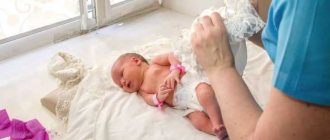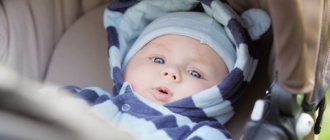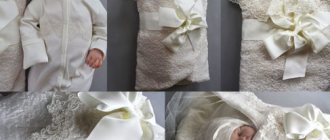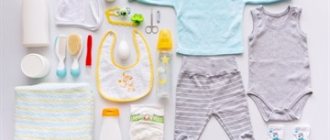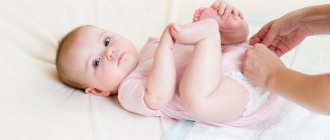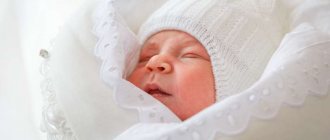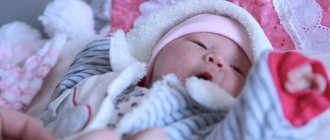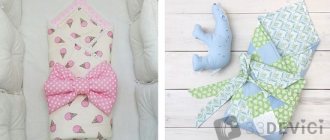Collection rules
- We collect documents in a separate folder or file.
- We pack everything only in plastic bags or bags. According to the sanitary and epidemiological regime in maternity hospitals, it is unacceptable to bring things in bags made of fabric or leather.
- We are preparing several packages: for the postpartum ward and for discharge. This distribution will help you quickly find the right thing.
- If you plan to give birth together with a relative, then we prepare a package for him with the necessary things.
- Taking into account the experience of many mothers and the recommendations of gynecologists, we have compiled a generalized list of what to take with you to the maternity hospital.
What to take to the maternity hospital and when leaving it: list of things
What should you take with you to the maternity hospital? Do I need to pack my maternity hospital bag in advance? When is the best time to go there and when will they be discharged from there? Any expectant mother would ask herself similar questions, especially if she is expecting her first child. After all, we practically cannot predict how the birth will go, whether it will hurt or not, but you simply must prepare everything you need for your stay in the maternity hospital. It is impossible to write a standard list of such things, since it all depends on what the maternity hospital can provide you. If you have already chosen a maternity hospital or agreed with your personal doctor, find out more about what you will need to take for yourself and for the baby. Some maternity hospitals warn pregnant women what they need to bring with them, others give out everything of their own. If you are giving birth at home, discuss this issue with your home midwife.
Collect all things in advance in a separate bag and set them aside. Moreover, it is better to immediately pack 2 bags - one for the maternity hospital, the other for discharge. And be sure to show these bags to your dad or the person who will give them to you at the maternity hospital. It’s even better to sign them “To the maternity hospital” and “To be discharged” so that at the most crucial moment nothing gets mixed up)))
Let's start by listing what you should always carry with you from the seventh month of pregnancy, when labor can begin at any moment:
- passport and its copy, - health insurance policy and its copy, - birth certificate, - exchange card, - mobile phone with charger, - referral to a maternity hospital or an agreement with a maternity hospital, or an agreement with a personal doctor. - address and telephone number of the maternity hospital - telephone number of the doctor with whom you plan to give birth.
And if suddenly the baby decides to be born at the most inopportune moment, then you can always call an ambulance or take a taxi to the maternity hospital you need, without wasting time traveling to get documents. Your relatives will bring you a bag with the necessary things later. The nurses will give you everything you need during childbirth.
Bag No. 1 “To the maternity hospital”
Find out in advance at your maternity hospital when it can be brought - immediately when you are admitted with contractions, or only the next day after birth. Because sometimes in state homes women in labor are admitted with labor pains only with documents and a mobile phone, and they are given clothes (they will throw them away anyway). And things for mother and baby are accepted only after childbirth, when it is determined which ward you will be in. If you go to the maternity hospital early, then, of course, you need to take your things with you right away. In private maternity hospitals, the situation is different - there is already a place allocated for you and the baby in advance, so you can go there with your things. In our online store you can buy a ready-made bag for women in labor, which contains the necessary hygiene items - pads, panties, etc. It is also advisable to get acquainted in advance with the list of products that you can take with you to the maternity hospital, so that there are no misunderstandings later.
So, things for staying in the maternity hospital:
— Hygiene products for you (what you usually use at home - toothpaste, shampoo, towel, comb, etc.). Some maternity hospitals provide these items, so find out in advance what you need to take with you and what is optional. Don't forget cosmetics - moisturizer for face and hands. After all, the skin becomes drier during pregnancy, so you need to moisturize it. Just remember that cosmetics must be safe and that they can be used during pregnancy.
— Hygienic lipstick. You will need it during childbirth, as your lips will dry out.
— Clothes in which you will feel comfortable feeding your baby (the breasts can be easily released) and which will not put pressure on your stomach. This could be a robe, a large T-shirt, a nightgown with an unbuttoned top, or special clothing for nursing mothers. You may also need cotton socks, a warm blouse, tights, etc., depending on the time of year.
— New slippers that can be easily washed (rubber ones are best). They collect less dirt than soft fabric ones.
— Towels (2 small towels and 1 medium size).
- A plate, fork, spoon and glass.
— A bottle of drinking water (without gas!).
— Purchase a nursing bra in advance. It will support the breast and will not interfere with the baby's feeding. In special stores for expectant mothers, they will help you choose the right bra size, taking into account the fact that in the first days after childbirth, the breasts increase (by about 1 size) due to a sharp influx of milk.
— Antithrombosis stockings. These stockings are worn during pregnancy and are also worn during childbirth. After all, during childbirth you will need to push hard, and this can have a bad effect on the veins, especially for those women who are predisposed to varicose veins. But by wearing anti-thrombosis stockings (not to be confused with tights), you can prevent the development of this disease. These stockings apply pressure to the legs, so the risk of blood clots and varicose veins is significantly reduced.
- Postpartum bandage. It will support an empty tummy and help it quickly return to its usual shape. — Postpartum pads. They differ from ordinary ones in size and greater absorbency. It is better to choose those that have an antimicrobial effect. — Special panties for fixing pads. They can be reusable or disposable. Such panties usually allow air to pass through very well, they do not put pressure on the stomach and do not cause irritation to the skin.
— Vitamins for pregnant and nursing mothers. Many inexperienced mothers are afraid to take any medications after childbirth, fearing that it could harm the baby. This is a normal fear, but you should definitely take vitamins for pregnant and nursing mothers, as they will help you and your baby recover faster after childbirth. The only thing is that you need to look at the baby’s reaction, since he may be allergic to some components of the vitamins. Therefore, it is better to take with you the same vitamins that you took during pregnancy.
— Cream or oil that prevents stretch marks. Of course, such products must be used throughout pregnancy, but they are especially needed before childbirth. After all, at this time, the breasts quickly increase in size (milk flows in sharply after childbirth), and at such a moment the skin experiences enormous stress. And a cream or oil for stretch marks will help her cope with this load.
— Nipple cream. It will help prevent cracks and irritation during the beginning of breastfeeding, when the skin on the nipples is still very tender and sensitive.
— Protective chest pads. They will help you feed your baby painlessly, even if you have cracked nipples. Also, special pads will help you correct flat nipples, making them more elongated. This will make it easier for your baby to latch onto the breast.
— Breast pads. They will collect milk, which in the first months after birth flows like a river from mommy in between feedings (if there are no problems with lactation). You can choose from disposable or reusable (they can be washed and reused). Instead of pads, you can purchase special breast milk collection pads. They will reliably protect your clothes from dirt and protect your nipples from irritation.
- Breast pump. In the maternity hospital, it will be needed in order to quickly establish breastfeeding and help the mother to “decant”, that is, to break through the ducts for milk. After all, the baby does not yet have much strength to completely empty his mother’s breast. And this is necessary so that milk stagnation does not form. A breast pump will help you avoid this. To do this, you can immediately buy an expensive electronic breast pump, but we still advise you to first try a regular mechanical one, since it is usually only required during the first month of breastfeeding. And then, when breastfeeding is already established, a breast pump may not be needed. Well, if you are going to often leave home, leaving your baby with a nanny or grandmother, and will continue to breastfeed your baby, then it will be more convenient for you to use an electronic breast pump. With it, you can express milk into bottles, and the nanny will feed it to the baby.
— A notepad and pen to write down doctors’ recommendations and pass notes to relatives.
— Books, magazines, player and other entertainment. But it’s better to take these things with you if you are going into confinement or before giving birth. And if you are going to go to the maternity hospital only with the onset of contractions, then, of course, you will not need books - there is simply no time left for them.
— A boiler or a small kettle (if allowed).
— Diapers for the baby. Ask in advance if you need to bring them with you, as some maternity hospitals still only allow gauze diapers (although this is rare). Buy the smallest pack of the smallest diapers, designed for a baby weighing 2–5 kg (or 3–6 kg). If they suit you (the baby won’t get diaper rash from them, they won’t leak or chafe), then you can buy these diapers in a larger package. But only 1 large package! Otherwise, the baby will quickly outgrow these diapers and will have to throw them away.
If you are staying in the same room with your baby, then you will need to take clothes and hygiene products for him (but be sure to check this question with the maternity hospital): - Cotton and flannel diapers, 5 pieces each, overalls or bodysuit (according to the season) . - Socks - 2 pairs. — Cotton and knitted caps – 3 pcs. - Wet wipes. They are convenient to use at night when you need to quickly change a diaper without disturbing your baby. - Baby soap. It is more convenient to take solid soap with you, as you can use it to wash your baby and wash dirty diapers. — Baby diaper cream or powder. — Plastic bags for dirty laundry.
If you are going to give birth with your husband, then he needs to take with him a passport, test results (usually for AIDS and hepatitis), fluorography results, washable slippers, drink and light food (if allowed). It is not necessary to take a change of clothes for your husband, since dad will be given some at the maternity hospital.
This is all you will need in the maternity hospital. Adjust this list according to the requirements of your maternity hospital and your preferences.
Let’s also clarify what products you can take with you to the maternity hospital:
- fruits: apples (green only) or bananas; — dried fruits: raisins or prunes (not dried apricots); — fermented milk products (be careful with fruit fillings); - sour cream; - fructose (sugar is not recommended for nursing); — mineral water without gases; — teas without fruit additives (black, nettle, chamomile); - cheese (hard varieties, mild, unsalted) - steamed cutlets or boiled meat; - boiled or stewed fish; - porridge (especially oatmeal); - stewed, boiled vegetables (except cabbage).
Products that new mothers should not bring:
— all types of confectionery products; - juices, compotes (except green apple juice); - jam, jam, honey, condensed milk; - grapes, kiwi; - tomatoes and other red-orange vegetables and fruits.
Bag No. 2 “For discharge from the hospital”
And now, several days after the baby was born, the doctor finally informs you that you are being discharged. Discharge from the maternity hospital is a joyful, responsible and at the same time frightening moment. On the one hand, you really want to go home, because the sight of the ward, uncomfortable beds and people in white coats is already wildly boring (especially if you were in the maternity hospital during pregnancy). I also want to be alone with the baby, look at him without diapers, and evaluate the similarity with himself and dad. On the other hand, it’s scary... even for experienced mothers. After all, after discharge, you will have to take care of the baby yourself, stay awake at night, determine why he is crying, wash, change clothes, feed, etc. And there will be no experienced doctors nearby who will immediately tell you what and how to do. All young mothers experienced such anxiety to one degree or another when it was time to leave the maternity ward. And to be more sure that everything will go well, we advise you to prepare everything you need in advance.
Usually, if everything is fine with the baby and mother, discharge from the maternity hospital occurs 3-4 days after birth. If you had a “caesarean section”, then 7-9 days. It’s better to ask your doctor and pediatrician in advance when they plan to discharge you and your baby. Before discharge, you will need to receive a certificate of birth of the baby, an exchange card for yourself and for the child (make a copy), a sheet with recommendations and a conclusion about the child’s health (be sure to clarify what procedures were performed and what medications were administered to the child). You can immediately give it to dad so that he can receive the child’s birth certificate. But if you wish, this moment can be postponed, since according to the law you can draw up all the necessary documents for the baby within a month after giving birth. On the day of discharge, ask your family to bring you bag No. 2.
It should contain the following:
- Clothes for you. It is better to take the things that you wore during pregnancy, since after childbirth the belly does not disappear immediately. Be sure to pack both outerwear and SHOES for yourself, since during the cold season young dads very often forget to take them.
— Clothing for a newborn. All clothing must be washed and ironed first. Of course, when choosing clothes for your baby when he is discharged from the hospital, you need to take into account the time of year:
In summer, especially in hot weather, it is better to choose a light knitted overalls or bodysuit, a cap, and wrap the baby in a thin diaper or cotton blanket on top. If it is very hot, then a thin vest, diaper and cap are enough. You can, of course, not swaddle the baby at all, but simply put a bodysuit on him, but then it will not be very comfortable for you to hold the baby in your arms.
In autumn and spring, choose warm clothes for your child, but not with fur. For example, a knitted vest and rompers, a flannel diaper, a knitted cap, a knitted hat, a cotton blanket, and an insulated envelope on top. Or this option - a knitted overalls with a fleece inside, a knitted cap, a warm suit (fleece or knitted), a warm knitted hat, an insulated envelope or overalls.
In winter, instead of insulated clothes, you need to wear warm ones - with fur or thick padding.
And don't forget to bring diapers!
— Decorative cosmetics to look great in photographs.
— You will need a car seat if you are going to travel from the maternity hospital by personal transport. And if you have not yet chosen a seat that suits you, then you can order a taxi with a child car seat.
— Gifts for maternity hospital staff. It could be a cake, sweets, flowers, etc. To give them or not to give them is up to you. But in any case, thank them for helping your baby be born.
— Flowers for a young mother! Just choose ones that don't smell too strong.
— A camera, a video camera to capture the touching moment of handing over the baby to dad and relatives.
See what you might need in the maternity hospital:
Manual or electric breast pump Nipple care cream Postpartum pads for women Nipple shields for feeding Maternity and nursing pillow Baby swaddle blanket
Here is an approximate list of things that you need to take with you to the maternity hospital and when you leave it. We hope you won't forget anything, and if you do, you won't worry about it. After all, the most important thing is not what you took, but how you prepared for childbirth. Be confident, smile more and everything will be fine. Have an easy birth!
Required documents
- Passport.
- Compulsory medical insurance (compulsory medical insurance) policy.
- An exchange card issued at the antenatal clinic with all tests and examinations.
- Birth certificate. It is issued by an obstetrician-gynecologist at the antenatal clinic at 30 weeks during a singleton pregnancy. If the pregnancy is multiple, the certificate is issued at 28 weeks.
- Sick leave from the antenatal clinic. It is usually issued along with the birth certificate within the prescribed time frame.
- Contract for paid management of childbirth and the postpartum period (if the contract was concluded on an individual basis).
If you plan to give birth with a partner
- Passport
- Conclusion of fluorographic examination. Other tests may also be needed.
This needs to be clarified in advance!
- Clean clothes (light pants, T-shirt)
- Disposable mask and cap.
What documents are needed for discharge?
The following documents are needed upon discharge from the maternity hospital:
- baby's birth certificate;
- an extract with information about the woman’s health status;
- conclusion about the child’s condition, his physiological parameters, vaccinations performed.
This documentation is prepared and provided by the maternity hospital staff. If a woman had a complicated birth, she is given an additional sick leave.
Package for mom
- Cotton robe and shirt. Check with your maternity hospital whether you can take your own shirt, as many maternity hospitals provide shirts that must be changed daily. The robe is useful for leaving the room in the corridor, dining room, shower and doctor's office.
- Two pairs of socks, they can be useful both during childbirth and after.
- Easy to wash flat shoes.
- Pure still water, at least 1 liter.
- Hygienic lipstick to avoid dry lips during childbirth.
- Hair tie if you have long hair.
- Elastic bandages or stockings.
- Disposable toilet seat covers.
- Terry towel.
- Sanitary postpartum pads 2 packs of 10 pcs. Regular pads are not suitable for menstrual periods, as the discharge after childbirth is more abundant.
- Disposable mesh panties, they are soft and stretch well (5-10 pcs.)
- Toothpaste and brush.
- Shampoo, liquid hand soap, shower gel, neutral soap for intimate hygiene.
- Comb.
- Toilet paper.
- Wet wipes.
- Nursing bra.
- Breast pads.
- Nipple cream to prevent cracks during breastfeeding. Most mothers prefer Bepanten.
- Postpartum bandage.
- Disposable absorbent diapers - 1 pack.
- Mug, teaspoon.
- Snack food (dry apples, green apples, tea bags). It is better to check the list of permitted products in advance.
- Necessary medications, if their use is agreed with the doctor.
Tips for choosing clothes for discharge, relevant for any season:
- For discharge in any season, it is important to choose comfortable clothes. Things purchased for the baby should not put pressure on the legs, arms, stomach and neck.
- Don't forget to take extra diapers with you when you leave. Newborns often get them dirty. To avoid awkward situations, you need to be ready to change them at any time.
- All things purchased for the baby, both new and given by friends and relatives, must be washed well. To do this, it is better to buy a special baby washing powder; it will definitely not cause irritation to the baby’s delicate skin.
- Mom should remove all tags from clothes that come into contact with the baby’s body, because they can easily damage the baby’s delicate skin.
- If you plan to pick up your baby from the hospital by car, don’t forget to check whether your baby’s outerwear has valves for the car seat belts. They will allow you to easily and quickly fasten your baby to the car seat and make your trip safe.
Newborn package
Some maternity hospitals prohibit taking any things and accessories for a newborn except diapers, while others do not have such a ban.
If there are no restrictions, then we collect for the child at the maternity hospital:
- Hat or cap 3-4 pcs.
- Anti-scratch pads 2-3 pcs.
- Socks 2-3 pairs
- Baby vests (thin and warm) 3 pcs.
- Sliders 4 pcs.
- Diapers - 5 pcs. warm (flannel) and 5 pcs. lungs. In the warm season, you can take only light 10 pieces.
Clothing size for a newborn full-term baby is 56-62, for premature and low birth weight babies - 50. It is better to choose models with seams facing outward so that there is no irritation to the baby’s delicate skin. First, clothes and diapers must be washed and ironed on both sides.
Used clothes and diapers must be sent home for washing, because according to sanitary regulations, washing and drying clothes in the maternity hospital is prohibited.
What to give as a discharge gift?
Discharge of a child from the maternity hospital is an important event that cannot be done without gifts from loved ones. Among the things that young mothers want and need in the first days are a crib, a car seat, a bathtub, a baby monitor, a feeding pillow, a sterilizer and a thermal bag for bottles. Read more about choosing the first things for a newborn →
High-quality diapers, onesies and bodysuits for growth, natural children's cosmetics, toys for the little ones (rattles, a mobile for the crib, etc.) will never be superfluous. A very appropriate gift is a certificate for a children's store, where young parents can choose everything they need.
If you carefully consider all aspects, you will get not just an original discharge from the maternity hospital, but a full-fledged holiday. The day will pass, but the memory of it will remain forever; what it will be like depends on all participants.
Author: Julianna Frei, especially for mama66
Useful video: choosing and installing a child seat in a car
Author
Julianna Fry
Author of the portal Mama66.ru
Share
Baby hygiene products
- Diapers for newborns – 1-2 packs (27-54 pcs). When choosing the size of diapers, we focus on the weight of the child.
- Liquid baby soap without fragrances or fragrances.
- Cotton swabs with limiter.
- Diaper cream, baby cream or oil.
- Wet wipes for newborns – 1 pack.
Price. How much does a good photographer cost for registration?
We will tell you about the prices of the photographers with whom we cooperate. These are the people who photograph holidays and important events of our clients. You can see their brief portfolio on our website in the photo section. You can also request from us the complete portfolio of the photographer you like in order to fully evaluate the shooting of one of the holidays.
Category 3 . 2000-3000 rubles per hour. Newbie photographer
Category 2 . 3000-5000 rubles per hour. Classic photographer
1st category . from 6000 rubles per hour. VIP photographer
We're going home! Discharging from maternity hospital.
It is better to buy a ready-made beautiful kit for discharge for a newborn. In the set, all items will be in the same style and color scheme: an envelope, a festive ribbon, a corner, a hat, a jumpsuit or a blouse with rompers.
If you plan to transport your baby by car, you need to buy a baby car seat in advance. In this case, you can purchase a onesie for a newborn with a hole for a seat belt.
What does a child need?
Wanting to provide comfort to the baby, mothers ask themselves: what does the child need for discharge? The main criterion is that things must be selected according to the season.
A sample list for discharge from the maternity hospital looks like this:
- diapers of the appropriate size;
- bodysuit with overalls or knitted rompers and vest;
- blouse;
- socks;
- 1-2 hats;
- envelope or transforming overalls.
Documents upon discharge from the maternity hospital. Not forget!
- Medical birth certificate for registering the child in the Civil Registry Office.
- Discharge summary from the history of the child's development.
- An extract about how the birth and postpartum period went for the mother (for the gynecologist in the antenatal clinic).
If you didn’t have time to buy something on the list for yourself or for your baby before going to the maternity hospital, don’t worry!
Your loved ones can buy goods for a newborn in the Island of Childhood store, quickly and in one place!
The sellers are mothers themselves and will always help with the choice. The online store is open 7 days a week, delivery is daily.
Have an easy birth!
How to dress your baby for discharge in the spring?
In spring, parents should not relax, because this is the most unpredictable season, when cold alternates with warming. To keep your baby warm on the day of discharge, he will need the following kit:
- Socks made of cotton and wool. To avoid irritation on the baby’s skin, wool socks should only be worn over socks made of cotton material;
- A cap or hat made of cotton material and a thin warm hat. As in the case of winter discharge, a thin cap should be chosen without seams on the inside. It is from such models that there will be no chafing or irritation. The warm hat must be the size of the baby, otherwise it will not cover the ears from the cold wind;
- Cotton one-piece suit. Experienced parents advise not to buy blouses and rompers, because they are suitable for older children;
- Fleece overalls;
- Envelope or overalls envelope. The advantage of the overalls envelope for many parents is that it is convenient to hold the baby in it. But many mothers prefer an envelope for spring discharge, as it is more practical and can easily be transformed into a blanket. You can use it not only on the day of discharge, but also in everyday life.
Discharge in spring or autumn
In spring and autumn it can be warm like summer and cold like winter. The deceptively warm sun is combined with an icy wind. Therefore, it is difficult to say unequivocally which outfit is suitable for a newborn at discharge. You need to focus solely on the weather. And as it gets colder, add layers. In the first days of September or at the end of May, most likely, a set of cotton, a thin cap, an envelope or a blanket will be sufficient. If it's cool outside, then you need to add a thick fleece or terry overalls and a flannel cap. Also wrap the baby in an envelope with a little insulation or in a blanket. If the temperature drops below 15 degrees, then you need a demi-season overalls. And by the end of autumn, you may need a full-fledged winter outfit.
